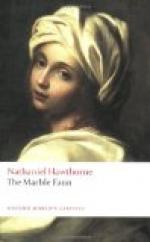We know not whether the result of her Italian studies, so far as it could yet be seen, will be accepted as a good or desirable one. Certain it is, that since her arrival in the pictorial land, Hilda seemed to have entirely lost the impulse of original design, which brought her thither. No doubt the girl’s early dreams had been of sending forms and hues of beauty into the visible world out of her own mind; of compelling scenes of poetry and history to live before men’s eyes, through conceptions and by methods individual to herself. But more and more, as she grew familiar with the miracles of art that enrich so many galleries in Rome, Hilda had ceased to consider herself as an original artist. No, wonder that this change should have befallen her. She was endowed with a deep and sensitive faculty of appreciation; she had the gift of discerning and worshipping excellence in a most unusual measure. No other person, it is probable, recognized so adequately, and enjoyed with such deep delight, the pictorial wonders that were here displayed. She saw no, not saw, but felt through and through a picture; she bestowed upon it all the warmth and richness of a woman’s sympathy; not by any intellectual effort, but by this strength of heart, and this guiding light of sympathy, she went straight to the central point, in which the master had conceived his work. Thus she viewed it, as it were, with his own eyes, and hence her comprehension of any picture that interested her was perfect.
This power and depth of appreciation depended partly upon Hilda’s physical organization, which was at once healthful and exquisitely delicate; and, connected with this advantage, she had a command of hand, a nicety and force of touch, which is an endowment separate from pictorial genius, though indispensable to its exercise.
It has probably happened in many other instances, as it did in Hilda’s case, that she ceased to aim at original achievement in consequence of the very gifts which so exquisitely fitted her to profit by familiarity with the works of the mighty old masters. Reverencing these wonderful men so deeply, she was too grateful for all they bestowed upon her, too loyal, too humble, in their awful presence, to think of enrolling herself in their society. Beholding the miracles of beauty which they had achieved, the world seemed already rich enough in original designs, and nothing more was so desirable as to diffuse those self-same beauties more widely among mankind. All the youthful hopes and ambitions, the fanciful ideas which she had brought from home, of great pictures to be conceived in her feminine mind, were flung aside, and, so far as those most intimate with her could discern, relinquished without a sigh. All that she would henceforth attempt and that most reverently, not to say religiously was to catch and reflect some of the glory which had been shed upon canvas from the immortal pencils of old.




